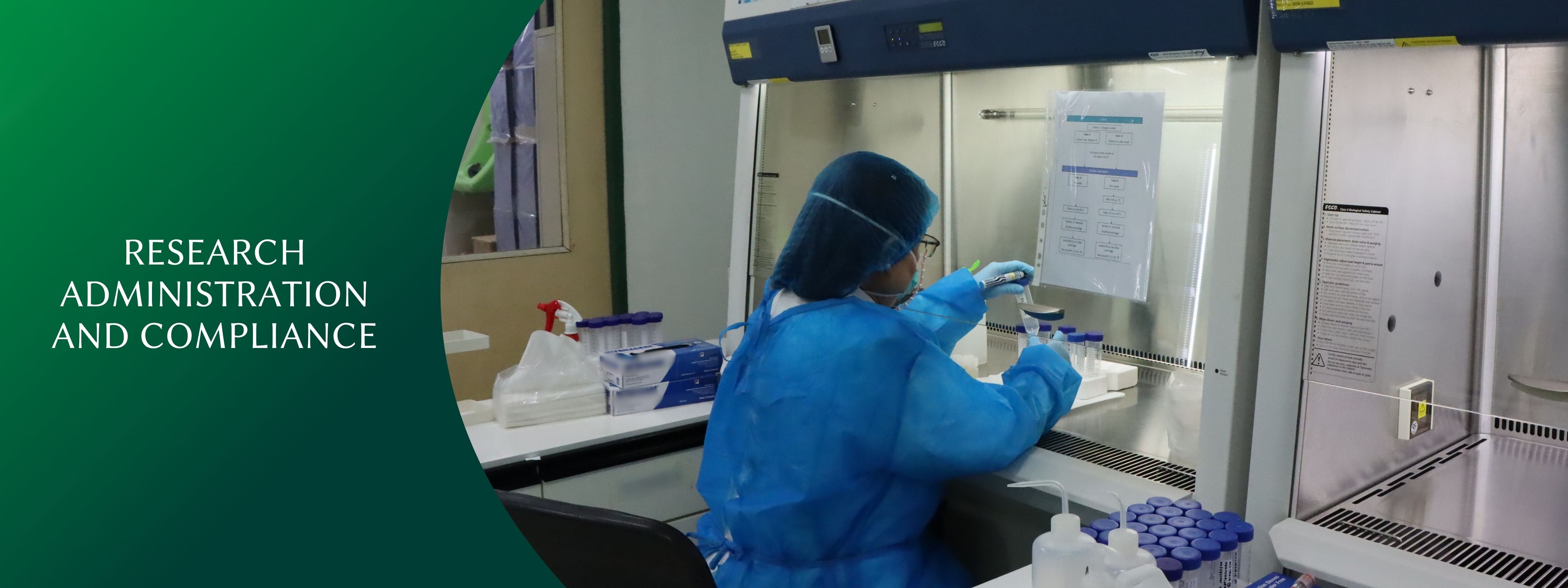The Research Administration and Compliance (RAC) Department ensures that all research activities within the Institution adhere to legal, ethical, regulatory, and safety standards, maintaining their integrity and promoting responsible, ethical, and compliant conduct.
Specifically, the department is responsible for the administrative oversight of the Independent Ethics Committee (IEC), the Technical Review Committee (TRC), the Institutional Animal Care and Use Committee (IACUC), and the Institutional Biological Safety Committee (IBSC), while ensuring the autonomy of these committees in their review, approval, and monitoring of research projects. It is also responsible for ensuring that all committees maintain their status by adhering to regulatory requirements and standards.
The RAC is also responsible for maintaining and managing all laboratories under the Research Services, including the Tuberculosis Research Laboratory (TRL), Bioscience Research Laboratories (BRL), and Bioanalytical and Pharmaceutical Research Laboratory. Additionally, it coordinates with the different DLSMHSI Colleges and the De La Salle University Medical Center (DLSUMC) regarding the use of their laboratory facilities for research purposes.
The Department also develops, maintains, and communicates research policies and standards for all research activities to ensure stakeholders are aware of the guidelines they need to follow.
Lastly, RAC is responsible for managing and maintaining the facilities of the De La Salle Angelo King Medical Research Center (DLSAKMRC), ensuring proper allocation of space for various research activities, including laboratory work and clinical trials.
OFFICES AND LABORATORIES:
- Research Facilities Management
The Research Facilities Management (RFM) serves as the central coordinator for physical facilities integral to diverse research activities. It aims to ensure the seamless functionality, safety, and efficiency of these facilities, encompassing laboratories and specialized spaces in the Research Services. RFM is tasked with maintaining and equitably allocating resources, ensuring optimal support for internal and external stakeholders’ research projects, clinical trials, and commissioned studies. Additionally, it actively engages in safety inspections and audits by disseminating relevant information to maintain a secure research environment.
- Research Integrity, Compliance and Safety
The Research Integrity, Compliance, and Safety (RICS) Unit is dedicated to maintaining rigorous internal oversight of various research activities, including human, animal, microbiological, and phytochemical studies. It ensures compliance with ethical standards, safety protocols, conflict of interest policies, and prevention of scientific misconduct. Responsibilities include receiving and screening research protocols from faculty members, residents, consultants, staff, and students, assessing technical and ethical aspects, as well as biological safety and animal care. The unit also collaborates with review committees to evaluate research proposals and regularly communicates with researchers to facilitate the review processes, providing status updates. Additionally, RICS supports researchers in meeting the standards for review prior to approval. In general, it aims to protect the rights and well-being of human and animal subjects, ensure compliance with regulations, and support researchers and staff in their scientific pursuits.
- Tuberculosis Research Laboratory
The Tuberculosis Research Laboratory (TRL) is a research facility dedicated to advancing tuberculosis (TB) control through its comprehensive range of clinical and research services. Specializing in quality TB laboratory services such as diagnosis, surveillance, and treatment monitoring for the hospital and clinical trials, it also contributes to the development and implementation of rapid and innovative diagnostic tests for TB. Additionally, the TRL actively builds collaborative partnerships for TB programs with the Department of Health, local government units, and the private sector, fostering resource pooling, advocating for quality standards, and integrating laboratory functions. By advancing TB control and surveillance programs, the TRL plays a vital role in the broader initiative to combat TB and improve public health outcomes.
- Bioscience Research Laboratories
The Bioscience Research Laboratories (BRL) comprise a range of research service and testing facilities, including the laboratory animal facility, microbiology laboratory, and chemical analysis laboratory. Serving as the central hub for animal bioassays, cell and tissue studies, microbiological tests, food and water analysis, and phytochemical extraction and analysis, these laboratories form the cornerstone of bioscience research activities. Moreover, BRL also extends its services to hospital and academic units, such as microbiological culture media preparation and the cryopreservation of microbiological and biological specimens.
- Bioanalytical and Pharmaceutical Research Laboratories
The Bioanalytical and Pharmaceutical Research Laboratories (BPRL) contribute to drug development by evaluating, monitoring, and advancing both prescription medicines and generic products. Its analytical services, which are integral for pharmaceutical safety, include bioequivalence/bioavailability testing and the conduct of clinical pharmacokinetic studies. Moreover, the laboratories provide analytical services to pharmaceutical companies and other industries, offering expertise in the quantitative analysis of compounds. BRPL also engages in drug surveillance efforts by conducting random drug testing to monitor and uphold public health and safety.
